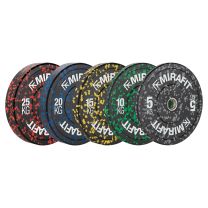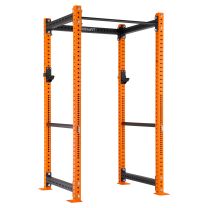Overtraining: signs and solutions
Overtraining: signs and solutions

Lifting Weights? Working hard? Not getting anywhere?
The struggle is real.
Many of us have experienced the great downfall of training. You lift, you gain, you get stronger and progression happens in great strides. The squat rack is your friend and you feel like a boss.
Then the period of early gains starts to curb and seeing that progression gets less and less frequent.
So, what do you do?
You train more, you lift more, and you dedicate more and more time to your training regime.
You may see a little progression, but you're still stuck in that training-rut. You feel down and irritable, your muscles hurt, your joints start messing up and you can't shift the cold that's been with you for the past few weeks.
Sound familiar? You could be overtraining.
How To Know If You're Overtraining

Overtraining doesn't actually happen to many of us. If you're down at the gym five to six hours a week, lifting and squatting, this probably isn't going to be the issue. In which case, if you're experiencing a plateau in your muscle gains, you might want to look at other factors contributing to your progression (weight load, nutrition, sleep, work stress, family commitments etc.)
However, if you find yourself working out more and more but you're still not getting anywhere – or, you find you're actually getting worse – you could be overtraining So, what are the signs?
• Sore muscles – and we don't just mean DOMS. Muscles, after an intense workout should start to feel better after a couple of days. And it's common for your body to feel less sore if you just grit your teeth and get back into the gym, so you can start filling those muscles back up with blood again. This way, your body adjusts to regular training and not being able to get down stairs will be less of an occurrence. However, if you're training every day and your muscles are always hurting, it could be that you're just not giving them enough time to repair. And if you haven't fully recovered, you're not going to benefit from your next training regime.
• Lack of sleep – many of us have experienced insomnia at some point in our lives. A stressful time in our lives, too much caffeine, anxiety etc. However, if you're completely wiped out but you're still struggling to sleep, then overtraining could be the cause. Training stresses your body and all the stress hormones that are produced as a result can really affect your sleep patterns. And when you're tired, inevitably, you reach for the coffee and energy drinks which don't help when you're trying to get to sleep either.
• Depression – training should help us feel good about ourselves as well as healthy and strong. But for some of us, spending all that time down at the gym – comparing ourselves to others or mentally criticising ourselves in front of the mirror, as well as depleting our energy levels – can lead to irritability and even depression. Because of this, it's important to address your motives behind your training to make sure health is your goal.
• Constant colds – we all know someone who has always got a cold. But if you know your immune system is pretty strong and you're not someone who usually picks up bugs, then this is worth keeping an eye on. If you start getting cold after cold, or you can't shift your cough, make sure your training regime isn't the cause here. Rest up, eat well and make sure your workouts aren't causing you to get ill.
• Slow or zero progress – are you finding that even by spending plenty of time in the gym, you're still not making any progress? By overtraining, you start to do more harm to your muscles than good. This means, zero gains and even worse, it can have a detrimental effect.
• Some of the other signs can be decreased appetite, weight loss, excessive thirst and changes in your digestive rhythm.
If you are training six days a week, perhaps even a couple of times a day, and you're experiencing a lot of these symptoms, then it could be that you're overtraining.
So, what can you do about it?
OVERTRAINING SOLUTIONS

When training forms such a big part of our everyday lives, cutting back or even just changing your routine can be a really difficult step to make. However, if you stay focused on helping your body so that you can get back on track, you will find it easier to make the necessary adjustments.
• Rest – first and foremost, you need to take a proper break so that your muscles can repair. They are currently torn and no matter how hard you try, you're not going to be able to strengthen a knackered muscle. Give it a proper rest – not a day – a few days or even a week. However long you need to start feeling yourself again. Plan in some relaxing activities so that you're not just sat at home feeling frustrated. But make sure they're not just going to stress your body in other ways. Going to the cinema, having a massage and getting some tasty, healthy food and a few early nights will really give you that boost so you can repair.
• Deload and reload – when your muscles have been overworked, you need to give them a well-earned break. Going at it 110% all the time isn't going to work. So, decrease the weights and do fewer reps and sets. Remember, you don't need to be in the gym for hours at a time to get a good workout. Regular training means doing it often but for 45-75 minutes max. If your regime takes you at least two hours, every night, you're doing too much. After you have given your body some time to recover, don't immediately whack the weight load back up. Use small increments and work your way up progressively; i.e. reload.
• Nutrition – it's impossible to gain lean muscle mass if you continue to diet alongside your weight lifting regime. If you're looking to get stronger, you need to give your body what it means to grow your muscles so that you have more to strengthen. Proper nutrition (as well as enough rest to recover) is vital. Vitamins, protein and healthy carbs, as well as plenty of fruit and veg and good fats will really help give your body what it needs to repair, develop and grow.
• Sleep – sleep is when we recover. If you're not getting enough of it, your body won't be able to take care of itself. Make sure you're getting eight hours of shut-eye a night! Try to wind down properly before bed so that you can get as much sleep between 10pm and 2am as possible. This is optimal for helping your body repair.
• Massage – massage can really help stimulate muscle repair. So, whether you get yourself booked in for a regular session with your sports therapist, or just familiarise yourself with a foam roller, make sure it's part of your routine.
• Split training – splitting up your regime so that you work different muscle groups on different days helps to give your body time to repair. Try and make it so you alternate upper and lower body regimes and don't forget to give yourself a proper rest day.
• Listen to your body – sometimes you have a bad training day. Sometimes you're tired or sometimes your body simply isn't up for training. There are so many other factors in life that will have different effects on your body. Listen to your body and if you're tired, rest. If you have lots of energy, go for it. And if you just need a mental break, take a day off and go back when you're ready so you feel energised.
Finally, training is about being fit, strong and taking good care of yourself. Fitness is the goal so don’t let body image and extreme training take over your life.
For more content, follow us on Instagram, YouTube, TikTok, and on our official Mirafit Facebook page.
Enter your email to signup to our newsletter
Tags: Misc > Lifestyle ; Misc > Recovery








